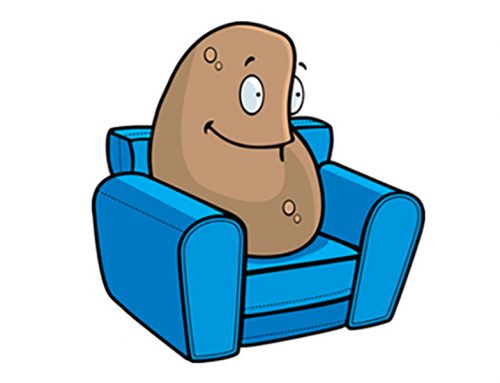You’ve probably seen the magazine articles or news blurbs thatsay, “lack of sleep can make you fat!” There is a lot of confusion however, about the mechanism. It’s not uncommon for people to believe there is a cause and effect relationship between sleeping less and gaining weight. However, if sleep deprivation did “cause” fat gain, then you would always gain weight if you slept less, even if your food intake stayed the same. To the contrary, if you sleep less AND eat less, rest assured you will lose weight. If you are awake more hours and you are more active during those increased waking hours, again, rest assured you will lose weight. So how does it really work? Why do you tend to gain body fat when you are sleep deprived?…
Almost all the research on this subject has been cross sectional and therefore does not prove causality. Research suggests that the likely explanation is a disruption in hormones which can affect appetite and foodintake so you are more likely to eat more when you are sleep deprived.
For example, a new study published in the December 2007 issueof “Nutrition Research Reviews” says that sleep deprivation canreduce leptin (the anti starvation hormone, also known as ananorexigenic hormone) and increase ghrelin, a stomachhormone that increases hunger.
This makes total sense – think about it: less sleep equalsmore awake time. more awake time equals greater energy needs.Greater energy needs can be satisfied by increasing appetitestimulating hormones. Leptin is an appetite stimulating hormone.
The human body is incredible and amazingly self-regulating, isnt it?
In addition, when hormones are out of balance, that can affectnutrient paritioning.
Nutrient paritioning refers to where the energy comes from whenyou have a calorie deficit – fat or lean tissue – and where theenergy goes when you are in a calorie surplus – fat or lean tissue.
So, when partitioning hormones are messed up due to sleepdeprivation, it’s entirely possibly that you are more likely toadd fat when in a surplus (not muscle) and lose muscle (not fat)when in a deficit.
This is similar to what happens during stress. Stress alsodoes not “cause” fat gain, but it certainly correlates tofat gain, for the same reasons. Imagine what happens whenyou are stressed AND sleep deprived?
Some people seem to get by with less sleep than others. I knowmany people, myself included, who excel physically on 6-7 hoursa night, so there is certainly a variation in sleep needs fromperson to person.
Developing sleep habits that promote deep, high quality sleepmay also reduce sleep needs an hour or two. This includes goingto bed and waking up at the same time every night, getting tosleep early and awake early to maximize night time sleeping hoursand daylight waking hours, sleeping in a dark room, avoidingalcohol and stimulants prior to bedtime, reducing stress andexercising regularly.
However, in light of past research and the new data that was justpublished, if in doubt, it’s surely better to err on the side ofa little more sleep than a little less sleep.
Train hard and expect success,
Tom Venuto,
Author of Burn The Fat, Feed The Muscle
PS What has your experience been regarding how much sleepyou need compared to other people you know and how have various amounts of sleep affected your fitness and body fat results? Share your comments by posting on the blog below
Scientific Reference:
The influence of sleep and sleep loss upon food intake andmetabolism. Nutrition Research Reviews, , 20:195-212,Cibele Aparecida Crispima, et al. Federal University of Sao Paulo, Brazil






I’m actually a little surprised people needed research to find this out.. It seems so clear to me.. Personally I need more sleep than those around me.. I need approx 8-9 hours or I notice a huge difference in how I function.. To add to that, the only time I get sick is when I have several nights where I don’t get enough sleep..So not only do i not function properly on less sleep, I end up having to take a break from training on account of being sick.. So I definitely fulfill the prophecy “lack of sleep can make you fat!” however it’s for more obvious reasons than what they are probably claiming.. :D
I agree Shelley, there are researches sometimes … it baffles me that anyone would waste time and money doing them they are so obvious. Who hasn’t heard their parents say they have to sleep to grow and get strong? Sleep is a vital part of living. Our bodies need rest. Get too little of it, and you have to compensate elsewhere for energy: food. And generally not the best choices, because you’re tired and can’t think straight.I need 8 hours/night. Less, and I get grumpy; more and I feel sluggish. 9 pm to 5 am suits me just fine, even though there are nights that start only at 9:30, but in that case I can compensate with a poer-nap in the afternoon.Strangely though, a short night, for whatever reason, has me setting personal records in the gym. Go figure.
I’ve been training for 2 1/2 years. Since I train, I need less hours sleep. I had a slow metabolism before. I used to need 8-9 hours per night. Now I get away with 6 to 7. However with 6 hours I am a little tired. I’ve lost 30 lbs since I started. However I do find I’m at a plateau. Its hard to lose more weight. Also I have so much to do, that I find sleeping a waste of time.Maybe if I get a minimum of 7 hours per night I would lose fat easier… I will give it a try.Jeanne from Montreal
i think sleep duration is an overated thing. it should be more about quality sleep. if you hit the pillow and almost fall straight into a great deep sleep then dont wake for 4-5 hours then this may be the same as someone that thinks they need 8-9 but wakes a few times, has trouble falling asleep and is inconsistent in there sleep times. my opinion is the body need only 4-5 hours, BUT THEY MUST BE QUALITY HOURS.sam
I have never been able to get more than 5 hours of sleep on weeknights, and I definitely believe the research that says it causes weight gain. I’m 53, have been consistently weight-training and dieting for over 2 years, and still feel like I’m fighting a losing battle. Yes, I’ve built up some nice muscle mass, but I can’t seem to lose my belly fat no matter what I do. Financial problems force me to work two jobs for a total of 14 hours a day, and about 10 hours each on Saturday and Sunday. Yet I still weight-train 5 or 6 nights a week (for about an hour), and add cardio work 3 or 4 nights a week (25 minutes of interval training on the elliptical trainer). All this activity means I can’t get to bed before 2 or 3 am, and then I get up at 7. I also have a weird “cycle” where I feel the most energetic after 10 pm, and I’ve been this way since I was a kid! I try to eat healthy (lots of protein especially), yet I’m carrying at least 25 or 30 pounds of ugly fat around my mid-section. Everywhere else looks fairly lean and muscular. If anyone has any suggestions (or wants to send me some cash) that would be great. ;^)
Doesn’t surprise me at all. I need 7.5 hours of sleep a night. More and I’m sluggish, less and I’m cranky. And as long as I keep regular hours, my exercise and eating stays on track. When I’ve been sleep deprived, the first thing that happens is I get hungry! Big time…. I can always tell when I haven’t had enough sleep cuz I’ll be peckish all day – and usually for the wrong foods! Sleep is my friend…..
I agree with you, Larry. I personally am an insomniac, always have been. Last night I was up till 5 AM, then got up at 7:30, despite having gotten up early the day before, exercised, etc. I eat in a very health-conscious manner, especially integrating the lean protein, but watching my caloric intake, and yet I cannot seem to lose those annoying 10-15 lbs. I do plenty of rigorous cardio and weight-training, and yet I still find myself unable to get as lean as I would like to be. Often, there are just way too many hours in my day. When I am up for 18-20 hours/day, I simply get hungry when I should be sleeping. It’s a frustrating cycle, one that I have seen specialists for, but no solution yet.
I remember from my mountaineering days that being short on sleep definitely increases appetite — a lot. Nothing like burning calories for 40 out of 48 hours in cold weather to make you hungry!Can’t comment on fat burning vs muscle burning — I just know that we ate anything we could get when we got back from a trip. Royal Fork buffets were good, as were very large pizzas with everything on them.Probably better nutrition would have sped up recovery time, but I didn’t know anything about that back then.
I’m the classic case here – I have a full time day job and work an overnight awake shift at a group home on Friday and Saturday nights – and there’s a couple of things that I think should be addressed here. One is the disruption in the cicadian rhythm that we all have, that dictates when we sleep and when we’re awake – I know that I usually can cruise along on 6 hours of sleep a night during the week and still get my workouts in, and feel good about them, but the weekends play havoc with my normal sleep patterns and also with my eating patterns, which, in turn, disrupts my weight loss.Secondly, and from the stuff that I’ve read (articles that I got from my nutritionist a while ago), because you force your body to go on less sleep, the brain (which as we all know is a carb pig) says “hello??? You want me to stay active, you’d better be prepared to feed me!!” and the carb cravings start, squashing the pattern of making sure that you get all your caloric intake in before 8 pm and let the cicadian rhythm take over and wind down and go to sleep. You’re contradicting it.Finally, and this is my last point – sleep before midnight is always more important than sleep afterwards. So, if you’re in a deep sleep prior to midnight, you’ll probably feel more refreshed and energized than if you go to sleep at midnight and wake at 6 am.Just throwing some stuff out there.
It’s not only the fact that researchers have to study it, but that so many people are STILL ignoring the fact that we actually need sleep. Two of my theories: we spend more time sedentary and not active, so our bodies don’t perceive such a high need for sleep as those who are active. When those who are sedentary go to bed, they may often wake up during the night (or have sleep apnea, another cause of sleep deprivation, depression, and consequently overeating). And the second theory: when we are tired, our bodies feel the need to supply it with energy to keep going, hence the cravings for sugar, since sugar provides the fastest form of energy. Thoughts?Also, I find I need 8 hours optimally, but if I tell myself before bed that it’s going to be a short night, I generally sleep that much harder and so feel fine in the morning. And on the comments about personal records in the gym on little sleep: perhaps the lack of sleep dulls the pain receptors and the mental barriers, so we’re able to push a little further? *grin*
I need 8-9h sleep!Best i feel when as much is before midnicht as possible!guy.
Hi Tom;For myself with sleep I have proven that when my body is trying to heal itself that I need more sleep because the body will regenerate itself when given the energy to do so. When given the positive energy the body will have the energy to get rid of fat and it requires more energy to get rid of toxins and to burn fat and this requires more sleep..If we listen to our bodies it will tell us what to do and when to to do it..Helen
Hi,I’m a mother of 3 who really has to work hard to maintain what many people would call a fairly ordinary body- my husband loves it though!. I can guarantee that sleep deprivation leads to weight gain!By the time I had my third child, my older two had given up their day sleeps, so where in the past I could supplement my 5-6 broken hours with a power nap during the day, by number 3 this was not a possibility. Just to keep awake, you feed your body, and on broken sleep one’e judgement simply isn’t what it should be, so if there’s poor food choices (mine was a craving for milo, lots of cups of milo!) you eat it.After a few months you do get used to less and poor quality sleep, so your judgement comes back- and having a friend with a body to die for even after three kids (Oh for such discipline and genetics!) to work out with, and be accountable to, works wonders! I can suggest that if you can afford it, a gym membership is great, that 1-2 hours 3-4 times a week of time (and a shower) to yourself is worth its weight in gold when your kids are young. But there is not a doubt- ask any mum- that sleep deprivation leads to eating more, simply to stay awake and function well.Now my kids are older, I enjoy 7-8 hours regularly, and my optimum is closer to 9. I do exercise regularly and eat very well- the threat of diabetes (a history of gestation diabetes puts me at high risk) and suffering from rheumatoid arthritis is excellent incentive to lead a healthy lifestyle. Hope this helps some mums out there!
I personally get 5 1/2 to 6 1/2 hours of QUALITY sleep per night and I feel outstanding!I’m fortunate enough that when I hit the time of day where I begin to feel a bit tired (1:30pm) I am able to head over to the gym for a workout.The workout gives me the boost that I need to get through the day.I also eat high energy foods such as sweet potatoes and oatmeal in the morning and loads of veggies and some fruit throughout the day.Not to mention lots and lots of water. According to research this is a huge factor when it comes to fatigue. Many people who get less than 7 hours sleep will pound back the coffee and neglect to get enough water into their body throughout the day.Our brains need plenty of water to operate optimally, not to mention the rest of our body functions that require it.I used to think that I needed 9-10 hours of sleep to function properly. Funny thing is, the more sleep that I got, the more tired I felt and the more sleep that I wanted. I originally thought it was crazy to sleep less, but as I slowly reduced the amount of sleep, I began to feel better.Out of the many contributing factors for weight gain, I believe that lack of sleep is towards the bottom of the list.For one, many people are not sleeping much and are totally stressed out. Now stress is definitely a factor when it comes to weight gain.Scott Tousignant, BHK, CFCwww.UnstoppableFatLoss.com
I agree with Scott. I recently moved from South Africa to the UK. The move was extremely stressful and I was averaging 5 hours sleep a night and one decent meal a day. My cycles stopped completely for 7 months. The result has been a 6kg weight gain (almost all of it around my waist) and needing 10 hours sleep a day just to feel normal. i put it all down to stress. I’m now back at gym and trying to get used to the 6 meals a day routine again. Hopefully everything will return to normal. Stress can really play havoc with your body, and I believe that the amount of sleep you need is often a direct result of how you function in your daily life.
I have worked midnight shift for years and years, and I’m a single mom. That all equals stress and more stress, lack of sleep, sleep when ever I can, not in a regular patern. My sleep regularly gets interupted. So I can get a few hours here, a few hours there…. All that stress has caused me problem emotions, causing me to eat badly. I’m always tired, so it was always and excuse to not have time or energy to make proper meals, thus lots of convienence food. All that racked up to lots of extra pounds. Any stress can cause you to eat too much. I just had to make the decission to conciously eat properly and put forth the effort to eat well. I have help from burn the fat of course. Lost 25 pounds. Still don’t sleep in a regular cycle, but have more energy with less weight and better food.
I get maybe 6 hours of sleep a night. I don’t have a weight gain problem, in fact i’m in the ‘skinny division’ that is actually trying to gain weight! The thing that I’ve noticed is that when I don’t get as good of sleep, I just don’t feel 100%. This translates into having a sluggish day (workout, work, etc.).
I’ve had horrible sleep patterns my entire life. Difficulty getting to sleep and difficulty staying asleep.Add stress and an over-active night time bladder and my body is in crisis!I’ve tried the going to bed at the same time every night and getting up at the same time. I don’t take naps either..I lift intensely 4 nights a week. My weight is remaining stable but my strength is diminishing.Over the past year I have lost 50 lbs and would like to lose about 5 more but it’s just not happening. Perhaps my poor sleeping pattern is the cause.I don’t sleep any longer than about 90min without waking up. My calories are on target for a wgt loss but it’s just not happening….